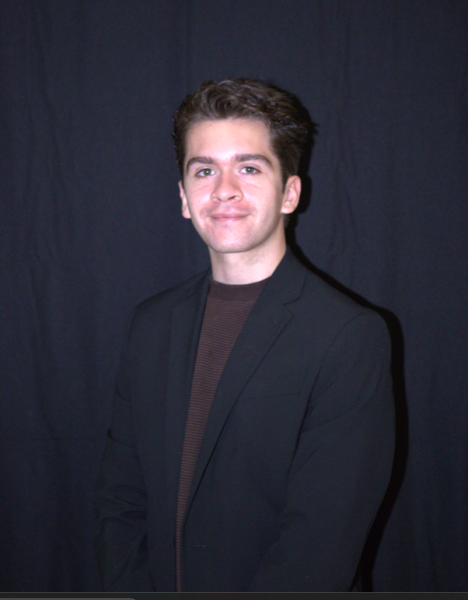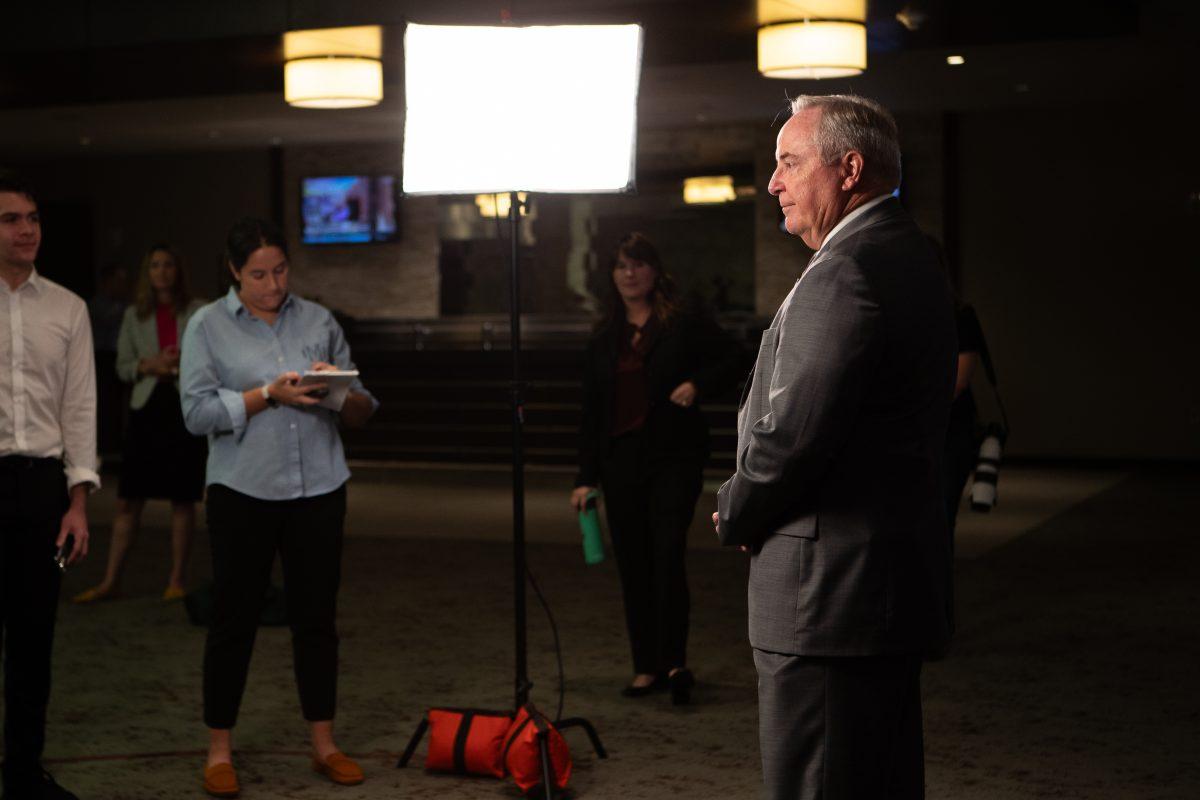The university continues to push forward, despite a summer of controversy.
In an all-staff, student and faculty meeting on Wednesday, Oct. 4, Interim President Mark A. Welsh III presented his decisions on former-President M. Katherine Banks’ Path Forward initiative, discussing issues facing the university, such as growing campus enrollment and librarian tenure.
On Sept. 19, a team including Vice President and Deputy CFO Joe Pettibon and Vice Provost Tim Scott, Ph.D., published a 32-page report detailing recommendations to the president on the university’s next steps for Banks’ initiative. On Oct. 4, Welsh presented his final decisions and said an accompanying survey received around 2,500 responses.
In the multi-hour-long meeting, Welsh went through the recommendations, showing the survey statistics and ending each with his final decision.
“One of the things that I have been impressed by, throughout this whole process, is that everybody I’ve talked to, everybody I’ve heard talking in our listening sessions, all the comments you read online — there’s no evil intentions here,” Welsh said. “Everybody really just believes in what they’re doing.”
Welsh said he would be reverting the Provost’s Office to its pre-Path Forward status by changing the title to executive vice president and provost to clearly identify the position as No. 2 in the university. The university will also move the vice president for faculty affairs position under the Provost’s Office, renaming the position to vice provost for faculty affairs.
Welsh also said multiple programs and offices will return under the provost’s control, such as the Aggie Honor System Office, Transition Academic Programs, the Public Policy Internship Program, the Texas Real Estate Center, the Private Enterprise Research Center and the Hispanic Serving Institution Initiative.
Welsh then said he instructed Scott and Pettibon to make a committee to study the campus-wide effects of enrollment growth.
“There are so many stressors here on campus that have to do with growth,” Welsh said. “ … How big are we gonna get? Are we going to 150,000 [students]? Stop at 80[,000]? We don’t know. All of us have to deal with this. We need an answer.”
Welsh said he would accept the recommendations regarding libraries to maintain the current model.
The university will also be adding $3.3 million to the library operating budget, Welsh said.
“Two big positions in this discussion were: go back to tenured librarians [and] recreate the model we had before,” Welsh said. “The group most strongly against that were librarians. They just didn’t want to go back to that right now. [Losing tenure] was pretty traumatic for them, and they don’t think that’s the most important thing right now.”
A task force on academic freedom will codify academic freedom for librarians in the near future instead, Welsh said.
Next, Welsh said a university-wide space allocation study will be conducted to make recommendations on proper location usage, such as the relocation of the Medical Sciences Library, a result of the Path Forward that’s now being reversed.
The College of Arts and Sciences will continue as normal and not be divided into multiple colleges, Welsh said.
“There are pretty strong views on both sides,” Welsh said. “ … There are a good number of people who agree that we should stay the course on this and give it a chance. They’re starting to see the benefits of a larger college — this a huge college, now. The College of Arts and Sciences is now larger than [the College of] Engineering.”
The Transition Academic Programs and the Office of Professional School Advising will also be moved out of the College of Arts and Sciences and to the Office of the Provost and Career Center, Welsh said.
He said the School of Performance, Visualization and Fine Arts will stabilize a business plan, and the school’s new building will be completed soon.
Welsh also said the journalism program will continue after the highly-publicized failed hiring of Kathleen McElroy, Ph.D.
“Let’s keep it going, reestablish the program,” Welsh said. “It’s been approved. It’s underway now. We had very visible issues this last summer, and we didn’t do a great job at finishing the hire [of] who I think would have been [a] great program director. So we just need to go find a great program director with the same kind of skill set.”
Welsh said he would be ending the pursuit of a life sciences meta major, an initiative that would’ve brought the engineering program’s entry-to-a-major system to life sciences.
Centralized advising would continue as normal, and the new information technology services management degree will stay in the College of Engineering, Welsh said. A separate report on the Galveston campus will be coming out next week as well, he said.
He also said the Counseling and Psychology Services, or CAPS, and the Student Health Services will be retained by the Health Science Center, reversing Path Forward changes.
Welsh said the final report with his decisions will be released soon.
“Some of these recommendations — they just won’t turn out well,” Welsh said. “ … We should always be in the business of getting better, too. Conversation about all these things should continue, and your voice has to be part of it. If it doesn’t, we fail.”
At a press conference following the meeting, Welsh said he began reviewing the Path Forward because it affects campus more than anything else.
“We changed major academic organizations, we shut down colleges, we built new colleges, we moved departments … we changed virtually everything,” Welsh said. “I think, clearly, when I came into the job, there was a feeling that there was confusion, frustration, maybe a little bit of anger about things. I wanted to make sure we went back and looked at those things we’ve been going through the last couple of years and make sure we understood what was causing it and if there was a way to relieve some of that tension.”
Speaker of the Faculty Senate Tracy Hammond shared a statement regarding the meeting.
“The president’s all-faculty, staff and students meeting made abundantly clear that Interim President Welsh understands and practices shared governance,” the statement reads. “He has listened to the faculty and made decisions based on their voice and relevant data. He provided a rationale for all decisions so that even when you disagreed with a decision, you could understand why the decision was made. I, myself, disagreed with at least one of the recommendations, but I was comfortable with the decision made.”
The statement said the most meaningful message was the respect Welsh displayed for faculty and staff.
“It made me warm inside to hear him say that he preferred to ask the faculty how to move forward rather than an external consulting company, and I was not alone, as it brought strong cheers from the crowd,” the statement reads.
The meeting brought students, staff and faculty together, the statement read.
“Given recent events, I think the biggest surprise was that there were no surprises,” the statement reads. “The faculty are starting to feel that they can stop acting like they are walking on eggshells and take a deep breath. In all appearances, it seems that we are finally moving forward together as one as we should have been doing all along.”
Welsh builds campus community in open meeting for staff, students
October 4, 2023
Photo by Julianne Shivers
Interim president Mark Welsh answers questions for reporters on Oct. 4, 2023 at the Hall of Champions. (Julianne Shivers/The Battalion)
0
Donate to The Battalion
Your donation will support the student journalists of Texas A&M University - College Station. Your contribution will allow us to purchase equipment and cover our annual website hosting costs.
More to Discover
About the Contributor

Nicholas Gutteridge, Managing Editor
Nicholas Gutteridge joined The Battalion in January 2023 as a news reporter before being promoted to news editor in August 2023. He has interned at The Pentagon in Washington D.C. and remotely with the U.S. Embassy in Cairo.
As a political science student, he studies the internal workings of political positions, and as a journalist, he seeks to bring those internal workings to light. He is the managing editor of The Battalion for the 2024-25 academic year.
Nicholas writes in-depth stories on topics important to students and community members. Previous articles include a dive into a student organization bringing students in contact with a sex offender, a feature on students alleging abuse and manipulation at a local church, and an investigative report on Texas A&M's Title IX enforcement.
Nicholas has published work in The Aggieland yearbook and the Maroon Life magazine. He has been honored with multiple nationwide awards, including first-place in-depth news story and first-place feature story. In September 2024, he won second place for nationwide reporter of the year, the most intense individual competition in collegiate journalism.









